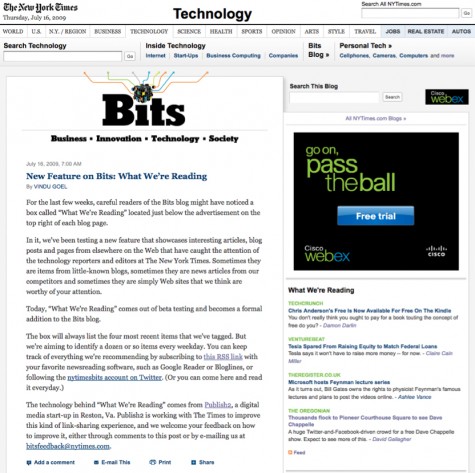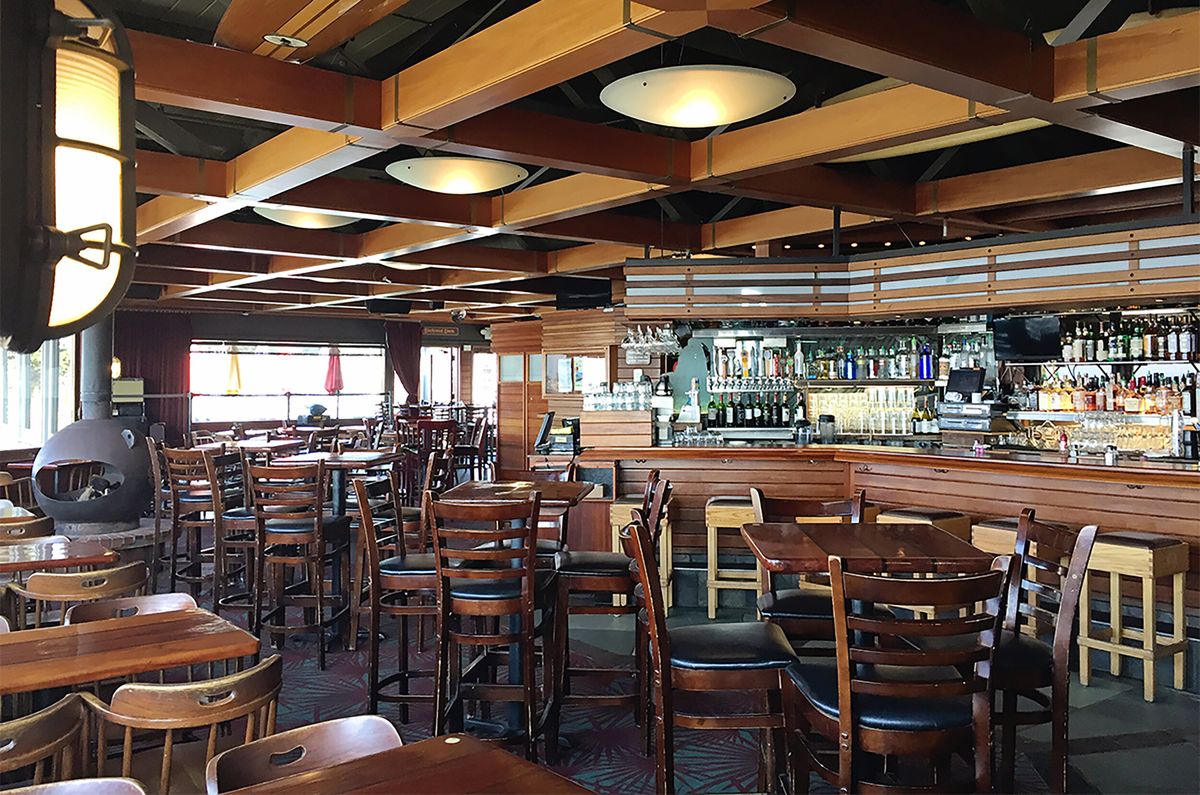Back in the dark ages of Web 2.0, I worked at a startup called Publish2, where we gave bloggers (mostly journalists) tools to curate links and publish them in the sidebar of their blogs.
“What I’m Reading” became the easy-to-understand shorthand title for these handy widgets, and this was interesting right up to the point that Twitter took over the intersection of journalists, bloggers, and publishing on the internet.
Everyone still loves a good linkdump – or even better these days, an email newsletter with a narrative. Today In Tabs is a personal favorite, though sometimes it’s a hateread about whatever the diaspora formerly known as Media Twitter is arguing about today, and right now it’s on a very specific hiatus, with Today On Trail subbing in while Rusty hikes the Appalachian Trail.
But I’m getting a little too far afield.

Now it’s just called journalism.
“What I’m Reading” was the core fodder for blog posts, sidebars, asides, and tweets – at least for me – for a good solid few years at the dawn of time. You’d open up your RSS reader, inhale some feeds, mash some buttons to share and comment on some links amongst your friends (in the glorious shorter-than-we-remember period of Google Reader primacy), and then open some of those in tabs and start writing your take on a topic, linking to other conversations and commentary, weaving your web, pun terribly intentional.
Somehow, in parallel, podcasts came into existence.
A brief aside on how I learn
I took a three-month sabbatical from Automattic starting in March 2023 and spent that time making music. I wasn’t completely out of touch with what was going on in technology, but I was focused on music, so if the rapid rise of Generative AI was accelerating in those three months, it only really surfaced for me in “not good enough yet” derisive asides or “should be interesting soon” excitement from some YouTube and Instagram music production creators I was following.
When I came back to work, the accuracy and utility of video call recording, note-taking systems, and summarization bots had all increased by roughly 1,000 times, in my estimation.
The first time I read meeting notes that a Claude-powered bot had authored based on a video recording, I looked into Uncanny Valley, felt mildly nauseated, and sat down to write about why I still take notes manually. (Of course I do.)
I drafted an internal blog post about it that I never published.
It went something like this:
In the internet middle ages, somewhere between the dotcom boom and bust (I had been busy carrying around heavy things on music video sets at the time) and MySpace winking into existence (I would later learn a lot about CSS thanks to Mike Davidson’s hack), I was a bartender.
And on the first day of my second bartending job ever, on Halloween 2002, an emotionally grizzled but California-presentable senior daytime bartender who did this job four days a week and had for an indeterminate amount of time asked me how I learn.
It remains the most important question anyone has ever asked me in a bar, as far as I can remember.
Literally no one, not in elementary school gifted programs or therapist’s offices or college administrators, had ever flat-out asked me how I best learned.
The senior bartender grew impatient. He was always just impatient enough to keep me moving. “Are you a visual learner? A hands-on learner? A notetaker?” THAT. I was a notetaker. I needed to write things down to cement them in my br— He pushed a plain white server’s notepad and pen into my hands and started teaching.
I took notes.

The physical act of writing in notebooks had been one of my primary methods of processing information since childhood, and in my professional career (post-bartending) in technology, I had carried it forward, always carrying a Field Notes notebook or something similar, as a stylish pocket square, a totem of thoughtfulness, a dumping ground for ideas, and a dated, numbered reference to return to later.
But mostly, the simple act of putting pen to paper helped cement things in my brain.
When I finally gave up on notebooks, it was to type into barebones text documents. Not Evernote or Simplenote or some sort of fancy notebook, just files like call_notes.txt to get the basics down, as if it was a narrow sheet of paper for some bullet points that I would translate into narratives with context later for publishing in internal blog posts.
I’m reconstructing and rewriting the internal blog post I intended to publish from memory now, and I’m not sure if this is where my draft trailed off, or if I said negative things about robot notetakers until I felt like I sounded like a Luddite and needed to cut it out right away.
I’m no Ned Ludd.
In time, I learned to love our robot notetaker friends. I love the robot editors even more. And I love the robot creators of tables and lists and well-organized documents much more, but I have a remarkable amount to learn, and to learn to love, about GenAI.
Back to podcasts
It’s funny. The first podcasts I listened to circa 2005-2006 were all about technology because those were the only podcasts that existed. In an early newsroom job, I helped an editor launch an early newspaper podcast and learned about editing and recording audio (circa 2006-2007). But when podcasts boomed again in recent years, I turned to them for entertainment, music, and sports, but never work.
Serial? Yes. All Songs Considered? Religiously, for a time. Men In Blazers? In streaks. (Rog once published a book called Bar Mitzvah Disco that features my elementary school music teacher, because of course it does.)
Even jumping ahead to 2022-2023, I was listening to Questlove Supreme (part of the inspiration for my reignited music production hobby) and then Bandsplain (How many hours about REM can I listen to? So many hours about REM.) And then, thanks to a colleague who mentioned it as we walked to cocktails or dinner or something near the end of ONA 2023 in Philadelphia, 60 Songs That Explain The ’90s, which is hilariously/finally back as of last week or so as “60 Songs That Explain the ’90s: The 2000s” which is an all-time great podcast name.
But I didn’t listen to podcasts for work. Until recently.
In a very short period of time, I found myself binging a suite of Sustainability podcasts while I was leveling up my knowledge on carbon accounting and helping a small team consider whether/how/where to buy software, and what to do with it.
I’ve been cooking dinner 3x weekly (bumped up that count during my sabbatical and kept it there, unless we have other conflicts that force schedule changes, or I’m traveling) and I love to slap on my bluetooth headphones and jack the speed up to 1.7x or so, trim the silence, and let it rip. I’m using Pocket Casts, an Automattic product. I switched from Apple Podcasts out of company loyalty to try it out, but I keep using it because it’s simple and fast and just works.
Here’s what I’ve been hearing:
- The Scope 3 Podcast: If you’re in Sustainability, you probably know this one. Well, I hope you do? They talk with one corporate sustainability leader, one sustainability software company, and break down some news. I listened to the first 8 episodes in a few days and then waited patiently for the next season to start this fall. There’s a community for practitioners behind the podcast doing regular meetings, events, and learning together.
- Green IO: Specifically about Sustainability technology, including episodes on data centers, AWS, open source, SEO, grid-aware web design, and lots of conversations with folks from corporate, nonprofit, and regulatory organizations.
- Unlearn: The Partnership Leaders podcast, great for niche learning about how different companies and verticals approach partnerships, alliances, marketplaces, and every issue on that spectrum.
- Lenny’s Podcast: aka Lenny on Product, aka Lenny. This is definitely the sort of thing people at work on other teams posted about, and I turned my nose up at, until I listened to it once, and… it’s amazing. Product managers and adjacent folks from all the biggest companies you’ve heard of, talking in GREAT detail about how they work, the tools they use, the approaches they take, the teams they’ve built, or left, or avoided, or craved. I can’t say enough about this. I’m learning every time I listen.
And because I still need to put my brain in music mode to reset some days, I’m still listening to QLS episodes (Tito Jackson was fun), Hanging Out With Audiophiles (deeply fun and detailed – find a name you like and listen, or try Animal Collective), Sodajerker on Songwriting (kind and thoughtful interviews with the greatest songwriters of our time – again, find your favorite or try something like Sheryl Crow or Elvis Costello), Patched (a modular synth podcast where the creator twiddles knobs live and talks about what they’re doing), and Alt Latino (from NPR, the All Songs Considered for Latin music while somehow also being fully its own creation).
So, yes, I learn by writing things down, but increasingly, I learn by listening openly, finding ways to take in new information as fast as I can while cooking dinner for the family or washing the dishes afterwards, while somehow also tricking my brain into thinking it’s being entertained. Maybe it is.